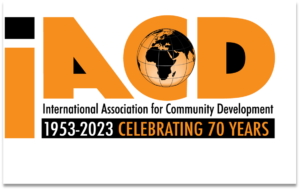
For over seventy years, the International Association for Community Development has been supporting community development practitioners around the world. In 2018, IACD celebrated its 65th birthday. Our World Community Development Conference was held in Ireland in June 2018 and a special anniversary issue of Practice Insights magazine was published to celebrate our birthday year (See below). This issue explores the key contributors and movements which shaped our profession over the past six and a half decades. In 2019 the World Community Development Conference was held in Dundee, Scotland, celebrating 21 years since IACD moved its HQ to Scotland.
Download the anniversary magazine here:
A LOOK BACK OVER TIME
1953: The International Association for Community Development was established in the USA.
Influencing the United Nations
In its early days, IACD members worked closely with the United Nations on developing its policies and programmes, as an accredited International Non-Governmental Organisation. The U.N. set up a Regional and Community Development Section and in 1954 a global review of community development was published, to which IACD contributed http://unesdoc.unesco.org/images/0006/000611/061170eo.pdf
A further paper, published in 1956, gives an insight as to how community development was being understood in the 1950s and which has subsequently influenced policy and practice across the world, i.e. as a process of technical assistance and inter-agency co-ordination to ‘under-privileged’ communities, that emphasises the active participation of those communities in their development. http://unesdoc.unesco.org/images/0017/001797/179726eb.pdf
Much of IACD’s membership and focus in the 1950s and ’60s was upon policy and practice in developing countries, primarily working in rural communities. In the 1960s and 70’s community development began to be more widely adopted as a policy within developed countries, especially around anti-poverty programmes such as the War on Poverty in the USA and against a backdrop of significant urban regeneration. There was also a growing awareness from the 1970s of community education work in Latin America especially in Cuba and Brazil. The USSR and China were leading proponents of community based health programs.
In 1967 members of the association were involved with the setting up of the International Community Development Journal. Published by Oxford University Press, CDJ is independent of IACD and has become the premier academic journal in our field. Marj Mayo, former IACD and CDJ Board member reflects upon these early years in this film: http://www.youtube.com/watch?v=tuchj3cXRWc Since then over a dozen ‘national’ community development related journals have been published.
By the late 1960s there were sufficient numbers of community development practitioners and academics in some countries to see the emergence of national professional associations, such as the Association of Community Workers in the UK, the Australian Community Workers Association and the U.S. Community Development Society. Subsequently national professional associations and networks have been established, (and in some cases have since disappeared), in many countries around the world.
1978: The Association moves its HQ to Belgium.
In 1978 the then Board decided to move IACD from the U.S.A to Belgium. There was an acknowledgement that community development type programmes already existed especially in francophone Africa and South East Asia and IACD began to attract members from these countries. IACD launched a journal called Comm, established a Community Work Training Clearing House providing information on available training programmes, ran conferences in Asia and Africa and provided small grants to local community development projects on behalf of the Belgian Overseas Development Ministry. Prof Rudolph Rezsohazy served as President of IACD for twenty years.
From the late 1980s, a growing concern grew about the lack of democratic transparency within IACD, the organisation’s representation of the more “traditional paradigms” of community development work, and its failure to embrace some of the more radical community organising and community education practice (Alinsky, Freire et al). This led to a call to open up the Board to a wider membership and to encourage community organisers and community education practitioners to join. This was also a period, with the end of the Cold War, when interest in community development grew in Eastern Europe, with IACD members beginning to make contact with practitioners and networks in Eastern Europe and the former USSR.
At IACD’s conference in South Africa, new members were elected to the Board, and a decision was made to move the association from Belgium to Scotland, with a new Secretariat. The IACD Board was restructured and reformed to ensure more democratic control of the organisation by its members through a directly elected Board. Board member, Charlie McConnell, the key driver behind the changes to IACDs direction, agreed to house the organisation at the Scottish Community Education Council in Edinburgh, where he was CEO.
1998. The Association moves its HQ to Scotland.
The association was relaunched at an international conference held in Edinburgh in 1999, and subsequently registered in Scotland as a charity. Charlie McConnell became Secretary General and Gary Craig, editor of the Community Development Journal, became President. A far more diverse Board was elected in 1999 and at AGMs since. With the move and relaunch, there began a recruitment campaign to get new members to join. The Scottish Community Education Council and then Dundee City Council gave critical administrative support to the organisation, and from 2004-12 financial support from the Scottish-based Carnegie UK Trust enabled IACD to employ its own part-time staff.
Since 2014, core funding has come from the Scottish Government enabling IACD to maintain its head office and part-time staff. Scotland has long held an internationalist outlook as a country and its government is keen to be seen as a ‘Country Champion’ for community development around the world. With a more diverse Board, IACD has been able to reach out across all global regions. In 2007 we appointed our first President from Africa, Alex Ruhunda and in 2010 the first woman President, Ingrid Burkett, from Australia. This film made in the early 2000s highlights the work we were doing at this time: https://www.youtube.com/watch?v=90yGW-W3YDc
The 2000’s – Raising the profile of community development
Increasing the number of conferences around the world
Since 1999, the association has greatly increased the number and scale of community development conferences. We have tried to run an international conference every one or two years, since 2018 called the World Community Development Conference. We have also increased the number of regional conferences/events. All of these are run in partnership.
Forging partnerships with national networks
In 2001 we agreed our first national partnership agreement, this was with the US Community Development Society. This was followed by partnerships with national and regional CD networks/associations in Canada, Hungary, Cameroons, Hong Kong, Australia, Scotland, The European wide CD Network, New Zealand, Nigeria, India, Philippines, Georgia, Ireland and Kenya. IACD commits to always holding international and regional conferences/events in partnership with existing national/regional CD networks/associations. This together with the launch of our Country Correspondents in 2015, the first being for China, strengthens our roots with the field in these countries.
Representing community development at the United Nations
The association has championed the importance of community development at the U.N and its agencies and since 1999 published several position statements and declarations agreed by members at our annual conference. We have attended many meetings and events at the United Nations, from the World Social Development Summit in Geneva in 2000 to the 2015 UN High Level Political Forum, where we ran an event on community development and the Sustainable Development Goals. IACD’s Vice President, Anastasia Crickley was appointed to chair the UN committee on the elimination of racism.
Launching the Practice Exchange continuing professional development programme.
We have focused upon promoting and facilitating learning and exchange about community development policies and practice in both developed and developing countries and the notion of community development as a multi-disciplinary profession. We set up the Practice Exchange programmes in 2004 to provide opportunities for small groups of community developers from around the world to visit field projects and meet with local community developers and activists in situ over several days.
Launching the magazine Practice Insights.
Practice Insights magazine, was launched in 2012. It is published two or three times a year, and provides an opportunity for members and invited writers to share their work. It includes special issues on themes such as poverty, empowerment and most recently, the contribution of community development in addressing the Sustainable Development Goals. We have also worked with our academic partner, the Community Development Journal, to publish papers from our conferences.
Launching the Global Community Development Exchange
Launched in 2016, GCDEX is an on-line repository of community development teaching and learning resources. It is a place where members can share their resources, tool kits, publications.
Adopting a new Global Definition for Community Development
Following a global mapping exercise of graduate community development training programmes in 2015, we were concerned that community development was being understood differently in many areas. In light of this, the Board decided to produce IACD’s own understanding of it as a multi-disciplinary profession. This was approved by members in 2016 – “Community Development is a practice-based profession and an academic discipline that promotes participative democracy, sustainable development, rights, economic opportunity, equality, and social justice, through the organisation, education, and empowerment of people within their communities, whether these be of locality, identity, or interest, in urban and rural settings.”
Publishing International Standards for Community Development Practice
Building upon the global definition of community development, the International Standards set a common framework for understanding and doing community development and for the knowledge, skills and ethics required to underpin it. Launched at the WCDC in 2018, the International Standards have been widely disseminated across the world in over a dozen languages. A book, building upon the International Standards is to be published by Routledge in partnership with IACD in 2021 called International Community Development Practice.
Our thanks to the Scottish Government for their continuing support of our core services, and to all our members worldwide. And to all who those who sustained the association over the past sixty five years.

